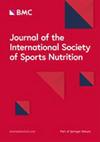The influence of caffeinated and non-caffeinated multi-ingredient pre-workout supplements on resistance exercise performance and subjective outcomes
IF 4.5
2区 医学
Q1 NUTRITION & DIETETICS
Journal of the International Society of Sports Nutrition
Pub Date : 2022-04-04
DOI:10.1080/15502783.2022.2060048
引用次数: 3
Abstract
ABSTRACT Background There is substantial consumer and practitioner interest in an emerging supplement class known as multi-ingredient pre-workout supplements (MIPS), largely due to their prevalence in resistance training communities as well as research findings demonstrating the ergogenic impact of caffeine on muscular performance. However, limited research has examined the potential efficacy of non-caffeinated MIPS, despite their growing popularity among those who are caffeine-sensitive or who train later in the day. Methods Twenty-four resistance-trained college-aged males (n = 12) and females (n = 12) completed three visits in which they ingested either a caffeinated MIPS (C), an otherwise identical non-caffeinated MIPS (NC), or placebo in a double-blind, counterbalanced, crossover fashion. Squat isometric peak force (PFiso), rate of force development (RFD), and isokinetic performance were assessed. Upper and lower body maximal muscular strength and endurance were evaluated using the bench press and leg press, respectively. Visual analog scales for energy, focus, and fatigue were completed five times throughout the testing protocol. The effects of supplementation and biological sex on all variables were examined using linear mixed effects models. Results Significantly greater PFiso was observed in both C (b: 0.36 transformed units [0.09, 0.62]) and NC (b: 0.32 transformed units [95% CI: 0.05, 0.58]) conditions, relative to placebo. Early RFD (RFD50) may have been higher with supplementation, particularly in females, with no effects for late RFD (RFD200) or peak RFD. In addition, increases in subjective energy after supplement ingestion were noted for C, but not NC. No effects of supplementation on traditional resistance exercise performance or isokinetic squat performance were observed, other than a lower leg press one-repetition maximum for males in the NC condition. Conclusions These data indicate that acute ingestion of either a caffeinated or non-caffeinated pre-workout formulation improved maximal force production during an isometric squat test but did not provide additional benefit to leg press, bench press, or isokinetic squat performance over placebo, within the context of a laboratory environment. The consumption of a caffeinated, but not non-caffeinated, MIPS increased subjective ratings of energy over placebo when assessed as part of a testing battery.含咖啡因和不含咖啡因的多成分运动前补充剂对阻力运动表现和主观结果的影响
摘要背景消费者和从业者对一种名为多成分运动前补充剂(MIPS)的新兴补充剂类别产生了浓厚的兴趣,这主要是由于它们在阻力训练社区中的流行,以及研究结果表明咖啡因对肌肉表现的人体工程学影响。然而,尽管不含咖啡因的MIPS在对咖啡因敏感或当天晚些时候训练的人中越来越受欢迎,但对其潜在疗效的研究有限。方法24名接受过抵抗训练的大学年龄男性(n=12)和女性(n=12。评估深蹲等长峰值力量(PFiso)、力量发展率(RFD)和等速性能。分别用卧推和腿推评估上半身和下半身的最大肌肉力量和耐力。在整个测试方案中,完成了五次能量、焦点和疲劳的视觉模拟量表。使用线性混合效应模型检验了补充剂和生物性别对所有变量的影响。结果与安慰剂相比,在C(b:0.36转化单位[0.09,0.62])和NC(b:0.32转化单位[95%CI:0.05,0.58])条件下观察到显著更高的PFiso。补充后早期RFD(RFD50)可能更高,尤其是在雌性中,对晚期RFD(RF D200)或峰值RFD没有影响。此外,摄入补充剂后,C的主观能量增加,但NC没有。除了NC条件下男性的小腿按压最大重复次数外,没有观察到补充剂对传统阻力运动表现或等速深蹲表现的影响。结论这些数据表明,在实验室环境中,急性摄入含咖啡因或不含咖啡因的锻炼前配方可以改善等长深蹲测试中的最大力量产生,但与安慰剂相比,对压腿、卧推或等速深蹲表现没有提供额外的益处。作为测试组的一部分,与安慰剂相比,摄入含咖啡因但不含咖啡因的MIPS增加了主观能量评级。
本文章由计算机程序翻译,如有差异,请以英文原文为准。
求助全文
约1分钟内获得全文
求助全文
来源期刊

Journal of the International Society of Sports Nutrition
NUTRITION & DIETETICS-SPORT SCIENCES
CiteScore
8.80
自引率
3.90%
发文量
34
审稿时长
6-12 weeks
期刊介绍:
Journal of the International Society of Sports Nutrition (JISSN) focuses on the acute and chronic effects of sports nutrition and supplementation strategies on body composition, physical performance and metabolism. JISSN is aimed at researchers and sport enthusiasts focused on delivering knowledge on exercise and nutrition on health, disease, rehabilitation, training, and performance. The journal provides a platform on which readers can determine nutritional strategies that may enhance exercise and/or training adaptations leading to improved health and performance.
 求助内容:
求助内容: 应助结果提醒方式:
应助结果提醒方式:


